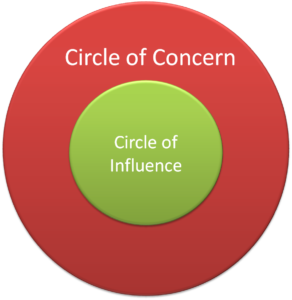By Shirley Wright, LMT
Years ago, I was lucky enough to be chosen to become trained and then become a trainer for Stephen Covey’s Seven Habits of Highly Effective People. (I became trained as a local trainer, within my organization.) This training has stuck with me over the years even now as I have become a licensed massage therapist and Reiki practitioner.
One might ask, “What does massage and Reiki have to do with Stephen Covey?” That’s a good question! Just this weekend, I attended an energy training facilitated by Susan Richardson, an LMT in Bangor. The group talked about energy – both positive and negative – and ways to clear our energy pathways when we feel agitated or are hit by negative waves of energy. One participant stated, “I just can’t seem to do the clearing. My work is so engulfed in negative energy. People come to me all day to complain and the negative energy swallows me. How can I use this energy work to help? I get lost.”
Ah, I have been engulfed by negative energy as well, more than once, in my work. You see, by day, I work as a public school administrator. It is hard work. There are days when I can relate to the statement above. It is hard to rise above the negative energy and it can “swallow” us if we’re not careful.
Stephen Covey, in his 7 Habits training, offers a way to deal with negative energy. He calls it his Circle of Influence and his Circle of Concern. It works like this. Draw a circle. Now, draw a bigger circle around that circle and leave some room to write in both circles. The inner circle should be labeled “Circle of Influence.” The outer circle should be labeled, “Circle of Concern.” Now, these circles can be used to brainstorm.
When people complain, and this works well in any organization, there are times when one needs to draw the circles. As people complain, clarify each complaint into the root cause and then decide which circle it goes into. Is it something that the organization can directly influence or change? If so, write it in the smaller circle, the Circle of Influence. Is it something that is a concern but that those in the organization cannot change quickly or is it beyond the reach of those in the organization to change? If so, it should be listed in the Circle of Concern.
Now, effective organizations should spend most of their time working within the Circle of Influence. To spend all of one’s time talking about items in the Circle of Concern is a waste of time; it’s griping. Spending too much time here will make an organization negative. Good leaders draw people into conversations about things that they can change. They validate others’ concerns but they must quickly shift from concerns to influence if they hope to make the organization better.
So, Stephen Covey can be useful, even in an energy training! It was amazing to me to be able to relate the two. We all carry positive and negative energy. To dwell on the negative will grow to others and can even set the tone of an organization. It’s amazing to me to see people shift that energy and knock down the negative and build up the positive. Spending time on those things that we can influence is a great way to start building positive energy.
My other favorite Stephen Covey quote is this one, “No one ever said, on his death bed, that he wished he’d spent more time at the office.” There is more to life than work and our work must become secondary to our families, our emotional health and our spiritual beings. We are surrounded by energy every single day as we live in our human bodies. Conscious thought and action is at the root of all energy – both positive and negative. I urge all reading this post to concentrate on the positive. Build a life of positive intention that nurtures the body, mind and spirit. Great gifts lie in store for those who do!

